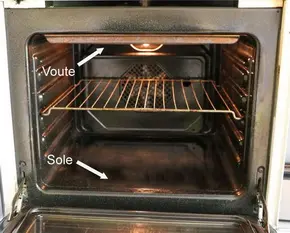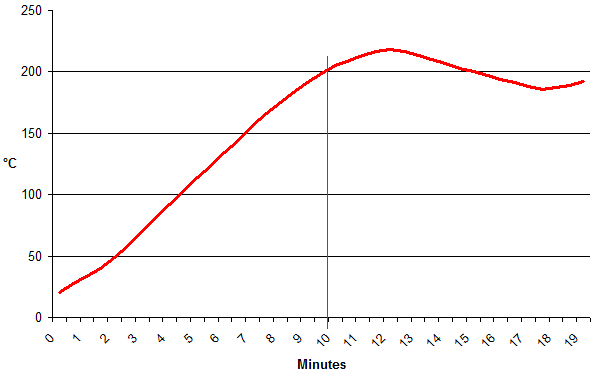This site uses only a few technical cookies necessary for its operation. By continuing to browse, you accept their use.
To find out more...
To find out more...
Should I believe my oven?

Can you really trust your oven? This is an important question as we are always tempted to take the temperature indicated as gospel truth and, unfortunately, this is rarely very precise.
33 K 4.6/5 (20 reviews)
Keywords for this post:OvenCookingTemperatureCheckingLast modified on: July 4th 2011
Should I believe my oven?
When I set my oven to 200°C, is it really at that temperature? The actual temperature can be measured easily if you have an accurate thermometer.
To check my own oven (a “De Dietrich” model UMP501), I placed the probe of the thermometer in the oven, closed the door, set it to 200°C and noted the temperature at 30 second intervals over 20 minutes.
Ideally, of course, the oven should heat up rapidly to exactly 200°C, then stay at this temperature until I open the door to put the food in, or until I turn it off. Unfortunately, the reality is dramatically different. Here is the temperature curve recorded:
From this graph we can note that:
1) The oven takes 10 minutes to reach 200°. So far, so good.
2) It beeps to tell me that it has reached 200° when, in fact, it is only at 191°, which is not so good.
3) Although it is supposed to stop heating at 200°C, it goes up to 217° before coming back down to 186°, and from then on it varies 10 or 20° around the set temperature, which is far from ideal.
These variations are significant but, fortunately, not the end of the world for most recipes. A little hotter or cooler doesn't make that much difference, and can be compensated by a slightly shorter or longer cooking time.
But take care, even so, with recipes that require a precise temperature, such as macarons or foie gras. For these, it is a good idea to measure the oven temperature when it indicates that it is at the right temperature, then adapt the recipe accordingly.
This is somewhat disappointing, as my oven was quite expensive at the time, and the salesman promised me an oven that had “precise temperature control” . But then, when it comes to selling, they always promise the moon.
So, in the end, in answer to the question “Should I trust my oven?” the reply is definitely: no, you should not trust your oven. Instead, you should measure and calibrate it beforehand to know how it really performs.
And then, we're talking here about an electric oven. Just imagine what's involved with a gas oven…
To check my own oven (a “De Dietrich” model UMP501), I placed the probe of the thermometer in the oven, closed the door, set it to 200°C and noted the temperature at 30 second intervals over 20 minutes.
Ideally, of course, the oven should heat up rapidly to exactly 200°C, then stay at this temperature until I open the door to put the food in, or until I turn it off. Unfortunately, the reality is dramatically different. Here is the temperature curve recorded:

From this graph we can note that:
1) The oven takes 10 minutes to reach 200°. So far, so good.
2) It beeps to tell me that it has reached 200° when, in fact, it is only at 191°, which is not so good.
3) Although it is supposed to stop heating at 200°C, it goes up to 217° before coming back down to 186°, and from then on it varies 10 or 20° around the set temperature, which is far from ideal.
These variations are significant but, fortunately, not the end of the world for most recipes. A little hotter or cooler doesn't make that much difference, and can be compensated by a slightly shorter or longer cooking time.
But take care, even so, with recipes that require a precise temperature, such as macarons or foie gras. For these, it is a good idea to measure the oven temperature when it indicates that it is at the right temperature, then adapt the recipe accordingly.
This is somewhat disappointing, as my oven was quite expensive at the time, and the salesman promised me an oven that had “precise temperature control” . But then, when it comes to selling, they always promise the moon.
So, in the end, in answer to the question “Should I trust my oven?” the reply is definitely: no, you should not trust your oven. Instead, you should measure and calibrate it beforehand to know how it really performs.
And then, we're talking here about an electric oven. Just imagine what's involved with a gas oven…
Lasts posts
XO Cognac Explained: Meaning, Aging, and Flavor Profile
XO Cognac always goes beyond the labels on the bottle: it is often associated with tradition and quality. You get to appreciate the artistry, character and ageing process when you understand what defines this smooth Cognac. The section below tackles everything about XO Cognac, from complex flavour...January 28th 20261,074 Sponsored article
Butter vs. grease
We often read in a recipe where a pastry is put into a mould that, just before pouring, the mould should be buttered or greased. But what's the difference between these 2 terms?December 1st 20252,6645
Getting out of the fridge early
Very often when you're cooking, you need to take food or preparations out of the fridge, to use them in the recipe in progress. There's nothing tricky about this: you just take them out of the fridge and use them, usually immediately, in the recipe. But is this really a good method?November 24th 20251,7055
Who's making the croissants?
When you look at a bakery from the outside, you naturally think that in the bakery, the bakers make the bread, and in the laboratory, the pastry chefs make the cakes. It's very often like that, with each of these professions having quite different ways of working, but sometimes there's also one...November 23th 20251,561
Oven height
When we put a dish or cake in the oven, we naturally tend to put it on the middle shelf, and that's what we usually do. But in some cases, this position and height can be a little tricky, so let's find out why.October 8th 20255,2965
Other pages you may also like
Tranché, dissociated, failed, in short... missed!
When preparing a sauce or a cream, there's always a (small) risk that the creamy preparation you're working on will suddenly separate into two parts of different textures: a liquid part, for example, and a more or less solid part, or even become lumpy. It's terribly frustrating, but we'll see...June 19th 202314 K5
Stand mixer tools
Whether we call it a stand mixer, food processor, or simply refer to it by brand (Kenwood, KitchenAid, etc.), this machine is a valuable tool for amateur cooks, bakers or pastry chefs like ourselves. All these machines come supplied with 3 different tools. Let’s take a look at their names and...November 2nd 201938 K4.5
Sugar syrups
In cooking, and especially in pastry, we often use sugar syrups, a simple mixture of water and sugar in varying proportions. Here is a presentation of their differences. .January 17th 202313 K4.8
The bitterness of endives
As I write these lines, we are entering the endive season, and if you like it, it's time to enjoy it, if possible with your local producers. Endive is good, but the reproach that is often made of it, and children in particular, is: "It's bitter! And it is (somewhat) true of course, endives...February 9th 201915 K4.9
The baker always gild twice
I've already told you about gilding, the beaten whole egg that is spread with a brush on anything that needs to brown in the oven: puff pastry, pastries, etc. and that professionals use a lot, I'm going to come back to this to clarify a bit how to do it, and give you a professional tip.June 9th 201936 K4.2
Post a comment or question
Follow this page
If you are interested in this page, you can "follow" it, by entering your email address here. You will then receive a notification immediately each time the page is modified or a new comment is added. Please note that you will need to confirm this following.
Note: We'll never share your e-mail address with anyone else.
Alternatively: you can subscribe to the mailing list of cooling-ez.com , you will receive a e-mail for each new recipe published on the site.









